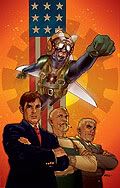"It's devastating. It's got to be doubly devastating on the ground."
-
George W. Bush, taking in the damage from aboard Air Force One two days after Hurricane Katrina struck the U.S."After the authorities in Baton Rouge had prepared a field hospital for victims of the storm, FEMA sent its first batch of supplies, all of which were designed for use against chemical attack, including drugs such as Cipro, which is designed for use against anthrax. "We called them up and asked them: 'Why did you send that, and they said that's what it says in the book'," said a Baton Rouge official."
-
Guardian"I want to give you one last story and I'll shut up and let you tell me whatever you want to tell me. The guy who runs this building I'm in, emergency management, he's responsible for everything. His mother was trapped in St. Bernard nursing home and every day she called him and said, ‘Are you coming, son? Is somebody coming?’ And he said, ‘Yeah, Mama, somebody's coming to get you. Somebody's coming to get you on Tuesday. Somebody's coming to get you on Wednesday. Somebody's coming to get you on Thursday. Somebody's coming to get you on Friday.’ And she drowned Friday night.... Nobody's coming to get us. Nobody's coming to get us. The secretary has promised. Everybody's promised. They've had press conferences. I'm sick of the press conferences. For God's sakes, shut up and send us somebody."
-
Aaron Broussard, president of Jefferson Parish in New Orleans, breaking down in tears on NBC's Meet The Press as he recounted how a colleague's mother drowned awaiting rescue from a nursing home."This was not just a hurricane; it was a hurricane that was followed by a flood…That 'perfect storm' of a combination of catastrophes exceeded the foresight of the planners, and maybe anybody's foresight," (Department of Homeland Security Secretary Michael) Chertoff said. He called the disaster "breathtaking in its surprise."
-
CNN"I don't think anybody anticipated the breach of the levees."
-
George W. Bush"Reuters reported that in 2004, more than 40 state, local and volunteer organizations practiced a scenario in which a massive hurricane struck and levees were breached, allowing water to flood New Orleans. Under the simulation, called 'Hurricane Pam,' the officials 'had to deal with an imaginary storm that destroyed more than half a million buildings in New Orleans and forced the evacuation of a million residents,' the Reuters report said."
-
CNN"In a nationally televised interview Thursday night, (FEMA Director Michael Brown) said his agency hadn't known until that day that thousands of storm victims were stranded at the Ernest N. Morial Convention Center. He gave another nationally televised interview the next morning and said, 'We've provided food to the people at the Convention Center so that they've gotten at least one, if not two meals, every single day.'
Lies don't get more bald-faced than that, Mr. President.
Yet, when you met with Mr. Brown Friday morning, you told him, 'You're doing a heck of a job.'
That's unbelievable."
-
Editorial, Times-Picayune of New Orleans"…a replay of the sinking of the Titanic. New Orleans' first-class passengers made it safely into lifeboats; for those in steerage, it was a horrifying spectacle of every man, woman and child for himself. The captain in this case, Michael Chertoff, the homeland security secretary, was so oblivious to those on the lower decks that on Thursday he applauded the federal response to the still-rampaging nightmare as ‘really exceptional.’ He told National Public Radio that he had ‘not heard a report of thousands of people in the convention center who don't have food and water’ - even though every television viewer in the country had been hearing of those stranded refugees for at least a day…Surely it's only a matter of time before Chertoff and the equally-at-sea director of the Federal Emergency Management Agency, Michael Brown (who also was among the last to hear about the convention center), are each awarded a Presidential Medal of Freedom…"
-
Frank Rich, NY Times, Falluja Floods The Superdome"Tired, hungry and traumatized by days spent under the damaged roof of a once-gleaming football stadium, the refugees of New Orleans have spoken of a nightmarish week living among the crazed and the desperate.
Stories of rape, murder and suicide have emerged.
Medical teams delivered babies in filthy conditions, with human feces never far away and fresh water in short supply. At least three were reported to have died.
Amid the filth and the crime, some snapped.
‘One guy jumped off a balcony,’ said Charles Womack, a 30-year-old roofer who was beaten and injured during his time at the Superdome.
‘I saw him do it. He was talking to a lady about it. He said it reminded him of the war and he couldn't leave.’
Fear ratcheted up the tension, with disturbing reports of mistaken identity emerging from the chaos. Police and national guardsmen were accused of killing innocent people.
‘They killed a man here last night,’ Steve Banka, 28, told the Reuters news agency before he left on Sunday. ‘A young lady was being raped and stabbed. And the sounds of her screaming got to this man and so he ran out into the street to get help from troops, to try to flag down a passing truck of them.’
‘He jumped up on the truck's windscreen and they shot him dead,’ Mr. Banka said.
Another man died in mysterious circumstances on Friday as a police car passed the New Orleans Convention Center, where equally squalid conditions forced many to sleep outside among streets full of rubbish.
More than 24 hours later, his body, like so many others, had not been moved.
‘Right where he fell,’ Larry Martin told the Los Angeles Times. ‘Like roadkill.’
On Saturday morning Africa Brumfield, 32, sat with relatives near the corpse of a young man in streets around the convention centre.
He had died on Friday night as he walked in the street.
‘There is rapes going on here. Women cannot go to the bathroom without men. They are raping them and slitting their throats,’ she told Reuters.
Inside the Superdome, a National Guard soldier charged with keeping order confirmed the brutal reality of life after Katrina.
‘We found a young girl raped and killed in the bathroom. Then the crowd got the man and they beat him to death.’
As Saturday ebbed past, an endless fleet of yellow school buses offered the dispossessed a passage out of their nightmares.
‘It's been a long time coming,’ Derek Dabon, 29, said as he queued for a security check.
Hillary Snowton, 40, sat with a white sheet wrapped around his face to shield himself from the smell of a dead body that lay, untouched, just metres away.
He had watched the body lie there for the past four days, decomposing in the sultry Louisiana climate.
He didn't see the point in moving away from the corpse, he told the Associated Press.
‘It stinks everywhere.’"
-
BBC News“Two police officers have committed suicide.”
-
Associated PressPublications from the local newspaper to National Geographic have fulminated about the bad state of flood protection in this beloved city, which is below sea level. Why were developers permitted to destroy wetlands and barrier islands that could have held back the hurricane's surge? Why was Congress, before it wandered off to vacation, engaged in slashing the budget for correcting some of the gaping holes in the area's flood protection?
-
NY Times Editorial"In an era of tax cuts for the wealthy, Bush consistently slashed the Army Corps of Engineers' funding requests to improve the levees holding back Lake Pontchartrain. This year, he asked for $3.9 million, $23 million less than the Corps requested. In the end, Bush reluctantly agreed to $5.7 million, delaying seven contracts, including one to enlarge the New Orleans levees. Former Republican congressman Michael Parker was forced out as the head of the Corps by Bush in 2002 when he dared to protest the lack of proper funding."
-
New Yorker, "Under Water""Since 9/11, FEMA has been basically dissected and taken apart."
-
James Lee Witt, former FEMA Director"I have to say that one of the worst potential repercussions of this calamity and the Bush administration's response is to show how utterly unprepared this country still is for some kind of terror attack, how little coordination there is between local and federal authorities, how evacuation plans are chaotic, how we have a president divorced from reality, and a Congress more interested in doling out pork than protecting the country. The message is this: come and get us. If al Qaeda had blown up the levees, can you imagine the chaos?"
-
Andrew Sullivan"Thousands didn't leave New Orleans because they couldn't leave. They didn't have the money. They didn't have the vehicles. They didn't have any place to go. They are the poor, black and white, who dwell in any city in great numbers; and they did what they felt they could do - they huddled together in the strongest houses they could find. There was no way to up and leave and check into the nearest Ramada Inn.
What's more, thousands more who could have left stayed behind to help others. They went out in the helicopters and pulled the survivors off rooftops; they went through the flooded streets in their boats trying to gather those they could find. Meanwhile, city officials tried desperately to alleviate the worsening conditions in the Superdome, while makeshift shelters and hotels and hospitals struggled.
And where was everyone else during all this? Oh, help is coming, New Orleans was told. We are a rich country. Congress is acting. Someone will come to stop the looting and care for the refugees.
And it's true: eventually, help did come. But how many times did Gov. Kathleen Blanco have to say that the situation was desperate? How many times did Mayor Ray Nagin have to call for aid? Why did America ask a city cherished by millions and excoriated by some, but ignored by no one, to fight for its own life for so long? That's my question. "
-
Anne Rice, New Orleans native and authorThe brunt of the catastrophe was directed at society's cast-offs; the poor and black who couldn't simply load up the $40,000 SUV and take off. They were left to face the rising waters and the government neglect without any prospect of real assistance. When you can't buy your way out, you're left to rot; that's how the ‘invisible hand’ of the free market operates. The message is clear; if you have nothing, you are nothing.
-
Mike Whitney, Rodney King In New Orleans"Out of the rubbles (sic) of Trent Lott's house -- he's lost his entire house -- there's going to be a fantastic house. And I'm looking forward to sitting on the porch."
-
George W. Bush, Friday, September 2nd."Just think of that quote for a minute; and the laughter that followed. The poor and the black are dying, dead, drowned and desperate in New Orleans and elsewhere. But the president manages to talk about the future 'fantastic' porch of a rich, powerful white man who only recently resigned his position because he regretted the failure of Strom Thurmond to hold back the tide of racial desegregation."
-
Andrew Sullivan"Our infrastructure is devastated, lives have been shattered. Would the president please stop taking photo-ops?"
-
Louisiana Senator Mary Landrieu"It is incredible, the government had no evacuation plan ... the first power in the world and it left its own population adrift."
-
Hugo Chávez, President of Venezuela"Health and Human Services Secretary Michael Leavitt tells CNN it's evident the number of dead is in the thousands."
-
Associated Press"A Halliburton Co. subsidiary that has come under fire for its reconstruction work in Iraq has begun tapping a $500 million Navy contract to do emergency repairs at naval facilities on the Gulf Coast that were battered by Hurricane Katrina."
-
LA Times"And I'm not looking forward to this trip. I got a feel for it when I flew over before. It -- for those who have not -- trying to conceive what we're talking about, it's as if the entire Gulf Coast were obliterated by a -- the worst kind of weapon you can imagine. And now we're going to go try to comfort people in that part of the world.
Thank you."
-
George W. Bush, Friday, September 2nd.
















